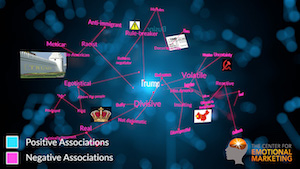Donald Trump conjures more negative associations in people’s minds than Hillary Clinton, a factor that could ultimately determine which candidate undecided voters pick at the polls in November.
 The findings come from a projective research study conducted by Westchester County, NY-based marketing consultancy Center for Emotional Marketing, which analyzed the emotional perception of undecided voters. CEM has roots in neuroscience and psychology and specializes in gauging the positive and negative principles that brands imprint in consumers’ minds. As it turns out, those same kinds of associative cues also translate to how voters feel about another type of brand: presidential candidates.
The findings come from a projective research study conducted by Westchester County, NY-based marketing consultancy Center for Emotional Marketing, which analyzed the emotional perception of undecided voters. CEM has roots in neuroscience and psychology and specializes in gauging the positive and negative principles that brands imprint in consumers’ minds. As it turns out, those same kinds of associative cues also translate to how voters feel about another type of brand: presidential candidates.
CEM conducted projective research on undecided voters in Tampa, FL and Columbus, OH in the week following the September 26 Clinton/Trump debate at Hofstra University, and discovered that while self-described “undecided” voters claim to remain conflicted regarding whom they'll vote for, their subconscious thoughts still exert an influence — often times a dominating one — on their choices. In other words, what we say we’re going to do and the decisions we actually make can be quite different.
The 2016 election presents a perplexing dilemma, given the country is preparing to elect one of two candidates who, according to virtually every poll available on the subject, are both viewed as widely flawed and distrusted by large swaths of the electorate. However, CEM’s projective research showed that Trump’s litany of negative associations far outweigh Clinton’s, and the quality and types of negative associations conjured by Trump seem to portend far direr consequences in voters’ minds, leading people toward favoring Clinton, if only by default.
“People lean toward the brand that has more positive associations than negative associations, and Trump’s is the brand that consistently has the worst associations,” Leslie Zane, Center for Emotional Marketing founder and president, told O’Dwyer’s. “When you look at these two brands in the minds of voters, both candidates have an abundance of negative associations, but given the dominance of negative associations that Trump has, it looks like they’re leaning toward Clinton, even though they’re not yet aware of it.”
When it comes to negative character traits, Clinton scored big on a lack of trustworthiness, and Trump led in terms of volatility and unpredictability. Trump’s sheer number of negative associations, however, ultimately alienates undecided voters and makes them feel less safe, which is somewhat ironic, considering defense and national security have been key focuses of Trump’s campaign platform. As a result, because Trump’s volatility and the potential impact it could have on national security outweigh a perceived lack of trustworthiness, the undecided voter edges toward Clinton as the candidate who will keep them safer, even if they’d vote for her only reluctantly.
 A short video detailing the symbolic representation of brand associations for Clinton and Trump that exist among undecided voters can be found here. A short video detailing the symbolic representation of brand associations for Clinton and Trump that exist among undecided voters can be found here. |
“It turns out that the wall, which was all about national security, sort of backfired, because it became this negative symbol in people’s minds,” Zane said. “They associate the wall with childishness. They associate it with divisiveness and racism. The intended use of that symbol is different from how our minds are actually taking it, and Clinton is inheriting this mantle of national security by default.”
Perhaps most telling, Zane said the study reveals that character and values are the most important drivers of voters' connection to a presidential candidate — far more important than accomplishment or achievement. Voters in the study couldn't remember or even think of one accomplishment of Clinton’s, Zane said.
“Character and values are most important to people, and they want to make sure the character and values of the candidates they choose are inline with their own. That way, in the future, voters can feel confident that who they vote for is someone who thinks and makes decisions the same way they would.”


 Husch Blackwell Strategies has added FleishmanHillard alum Michael Slatin as a principal in its public affairs group.
Husch Blackwell Strategies has added FleishmanHillard alum Michael Slatin as a principal in its public affairs group. Rory Cooper, a veteran Republican operative and policy specialist, has joined Teneo’s Washington office as senior managing director in its strategy & communications practice.
Rory Cooper, a veteran Republican operative and policy specialist, has joined Teneo’s Washington office as senior managing director in its strategy & communications practice. Brian Fallon, who served as national press secretary for Hillary Clinton’s 2016 presidential run, is signing on next month as Vice President’s Kamala Harris’ campaign communications director.
Brian Fallon, who served as national press secretary for Hillary Clinton’s 2016 presidential run, is signing on next month as Vice President’s Kamala Harris’ campaign communications director. TikTok is nothing more than a Chinese propaganda tool that poses “a grave threat to America’s national security and, in particular, impressionable children and young adults,” say two Congressmen who want the platform registered as a foreign agent.
TikTok is nothing more than a Chinese propaganda tool that poses “a grave threat to America’s national security and, in particular, impressionable children and young adults,” say two Congressmen who want the platform registered as a foreign agent. Public Strategies Washington has added Abbie Sorrendino, a former aide to now Senate Majority Leader Chuck Schumer.
Public Strategies Washington has added Abbie Sorrendino, a former aide to now Senate Majority Leader Chuck Schumer.


 Have a comment? Send it to
Have a comment? Send it to 
No comments have been submitted for this story yet.